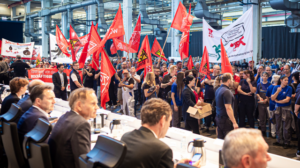Last week in Brussels, unions stood with workers at Audi’s factory in Belgium, protesting the company’s plan to close the electric vehicle plant that once began there as a model of technology and modernity.
An industry in a nervous breakdown
The company, a subsidiary of Volkswagen, is facing problems that analysts see as indicative of the industry’s malaise. The parent company has been leaking for some time its intention to close plants in Germany itself, which could lead to the layoffs of up to 30,000 workers.
In Belgium the number of jobs threatened is about 3,000 and unionists are outraged. Their anger, however, is largely directed against politicians, as unionist Dominique Bray’s statements attest: “The real culprits are the politicians, that’s clear. We can see that we have allowed ourselves to be swallowed up by the Asian market, the Chinese market. It’s something we shouldn’t have let happen. All these rules on internal combustion engines have caused us great difficulties in the manufacture of vehicles. They wanted to move too fast with these electric cars.”
?The Volkswagen disaster is now becoming concrete!
And all the companies that work VW or suppliers etc so there should be or will be far more pic.twitter.com/Q2FIL3ZOIB
– Walde Pascal (@Pfeffer7373) September 19, 2024
Call for help
The problem is not just about this particular company or just the German automaker. Last week, the European Automobile Manufacturers Association wrote to the Commission last week calling for a relaxation of strict carbon dioxide emissions standards and pointing to a significant drop in electric vehicle sales over the past year.
Were the Europeans in a hurry to adopt such strict standards? Did they shoot themselves in the knee? That seems to be what Carmelo Liberto, another union spokesman, seems to think: “Because of political decisions, the industry has been abandoned in Europe. That is why we are demonstrating today.”
This is why this is the reason why we are now celebrating today.
A fellow trade unionist from the energy sector, Philippe Lecoq, has a similar view:“European standards for the environment are very good, but we are in a difficult position because we in Europe are the only ones in the world who are doing this. So we are sacrificing ourselves on the altar of globalisation.”
The information about a possible transfer of the plant outside Europe has angered the workers even more. “With Audi, our current model is going to Mexico. So there are policies that actually favour the arrival of companies at the expense of Europe.”
Are tariffs a solution?
The Commission’s choice to respond with tariffs to competition from China is disputed by both experts and governments, such as Germany or Spain, who fear the consequences of a trade war with Beijing. The equation is a difficult one. The industry is gasping, workers are fearful, consumers are hesitant, and politicians continue to make plans on paper that often prove difficult to work in real life. The challenges for the European automotive industry sometimes seem insurmountable.
.
Ask me anything
Explore related questions





